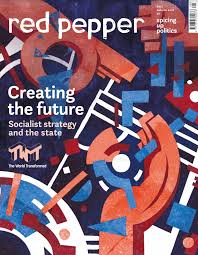 After ten years of occasionally contributing to Red Pepper, now I’m back in the UK I am taking up a new role as a regular columnist and Editorial Collective member.
After ten years of occasionally contributing to Red Pepper, now I’m back in the UK I am taking up a new role as a regular columnist and Editorial Collective member.
My focus is building out the culture section and, as we move to a quarterly publishing cycle, I’m aim to take a deep look into a different theme in each issue. My column is entitled ‘Roses too…’ – a feminist nod to the importance of culture within our politics.
Following a summer of World Cup fever, this section focused on Football. I introduced with a broader look at British cinema, biennials, and the beautiful game.
No magical realism please, we’re British
Despite early anticipation, the British comedy-drama Funny Cow left audiences and critics underwhelmed when it hit cinemas this summer. The film is available to rent or buy from October and is worth seeking out. Billed by distributors as ‘a love-letter to a bygone era and the defiant story of a woman who refuses to give up her dreams’, it traces the life of a female comedian rising to fame in the 1970s.
The synopsis frames it as a companion piece to British favourites like The Full Monty, Billy Elliot and Pride. But Funny Cow is a different beast. Its characters, including Maxine Peake’s lead role, are frequently unsympathetic. Its slice-of-life portrayal of working men’s clubs does not seek to redeem those who make, or cheer, racist and homophobic jokes.
A love letter this is not. It is an ambitious, challenging fantasy that subtly guides viewers to question whose version of events they are watching. A good stand-up, after all, excels at telling stories about themselves.
Writer Tony Pitts riffs on the classic French short film The Red Balloon to explore gritty lives, loneliness and broken dreams through a magical realist lens. It’s a bold choice – and one the film’s promoters clearly missed. Funny Cow defies the increasingly stifling conventions of recent British ‘social issue’ cinema, much of which falls into two predictable camps: worthy-yet-bleak tales made in the Ken Loach mould (if not by the man himself ), or success-against-all-odds stories in which comedy triumphs over tragic subtext.
A good stand-up, after all, excels at telling stories about themselves. Stark reminders of painful realities might couple well with feelgood narratives, in terms of educating and sustaining movements. But we also need to be challenged by complex questions, shades-of-grey heroes, difficult histories and imaginative storytelling. Funny Cow is a good start.
Football sun and shadow
As an avid fan and regular player (a description apt for millions globally), this summer’s World Cup was but one highlight in an endless calendar of football activity. In Britain, the 2018-19 season is underway, this year with unprecedented attention focused on the women’s league – well-timed in preparation for next summer’s women’s world cup. The 16th homeless world cup arrives sooner, hitting Mexico on 13-18 November. It is expected to draw millions of online viewers.
Meanwhile, across Europe, fan organisations continue to wield notable political influence and are taking to the streets in far-right as well as anti-fascist coalitions. As Eduardo Galeano reminded us in Soccer in Sun and Shadow, the ‘beautiful game’ is also a place of darkness. The articles on pages 70-77 remind us that football, more than once every four years, is a deeply political terrain.
The biennial and end all?
The Liverpool Biennial, which runs at sites across the city and online until 28 October, is intended to ‘reflect on a world in social, political and economic turmoil’. In terms of provoking thought and awe, it succeeds. The work on display has been created by an impressive array of international artists and justifies a special trip to the city.
The tourist draw partly explains why biennials and other temporary festivals or ‘City of…’ designations are so popular. As curator friends have reminded me of late, however, they can come at a cost to local artists. Year-on-year cuts, increased competition for corporate funding and emphasis on feet through doors over quality engagement are eroding opportunities for artists’ development. The reverberations of spectacular biennials must endure if they are to be felt long term, at the local level.
Citation: S. McGuirk (2018) “Further than feelgood” Red Pepper Issue 221 (Autumn 2018), p. 69.